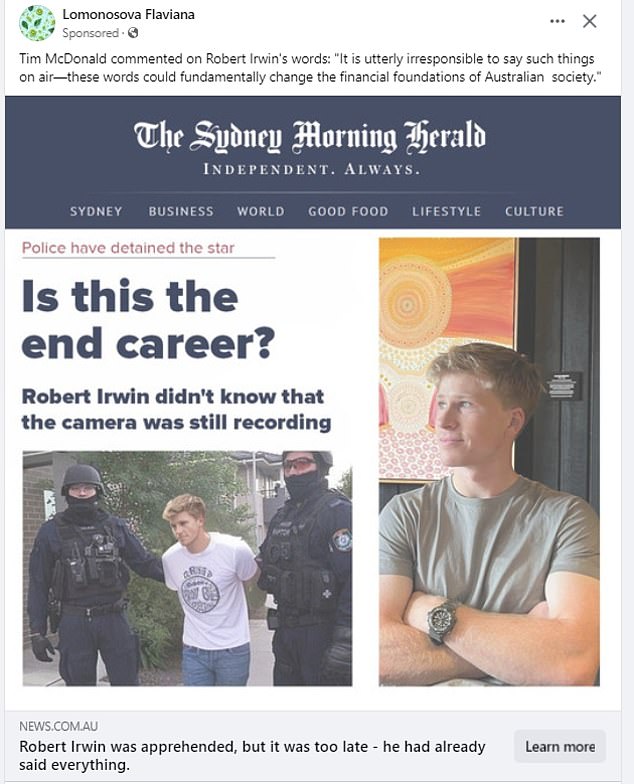Scammers have targeted Robert Irwin with misleading ads on Facebook claiming he has been arrested, as part of efforts to scam Australians out of their hard-earned money.
The misleading ads are fake mock-ups of the front pages of major Australian newspapers showing Robert Irwin being arrested, with his arms pinned behind his back, as he is led away by police.
The images are completely fabricated and have been created using artificial intelligence to make them look authentic.
One hoax spreading on Facebook is a fake Sydney Morning Herald front page with the headline: “Is this the end of his career?” Robert Irwin didn’t know the camera was still recording.
One hoax spreading on Facebook is a fake Sydney Morning Herald front page with the headline: “Is this the end of his career?” Robert Irwin didn’t know the camera was still recording.
Link to a fake news article claiming the Bank of Australia is suing Robert Irwin over comments he made on live television.
The fake news article describes a completely made-up incident during an episode of The Cheap Seats.
In this fictional account, Irwin is alleged to have revealed a non-existent platform called Trade iPlex 100, which could supposedly make people rich through AI-powered cryptocurrency trading.
Readers are asked to give Mr. Irwin $375 so he can make money using cryptocurrency.

Mr. Irwin is in no way involved in the scams. Pictured with his mother Terri.
None of this is true. The incident, the platform and the claims are entirely made up by scammers trying to take your money. Mr. Irwin is not involved in any way.
The Australian government’s National Anti-Scam Center said scammers use the image, name and characteristics of famous people without your permission, to force you to “invest” in cryptocurrency scams.
These can be very realistic, as scammers use artificial intelligence (AI) to create “deepfakes” of the person. These images and voices can be very difficult to recognize as fake.
Images of celebrities are often used in advertisements on social media or YouTube, fake news that appears to come from a well-known news company.
How scammers target Australians
Money lost to scams is heading in the right direction, even as scammers take advantage of the cost of living crisis to target people looking for side businesses.
An 11 per cent drop in total scam losses was recorded during the March quarter, the National Anti-Scam Center said in a report.
Most of the improvement was due to the reduction in losses caused by investment scams.

Several fake news articles about Robert Irwin have spread online. None of this is true. The incident, the platform and the claims are entirely made up by scammers trying to take your money.

However, with a considerable loss of $73.2 million to scammers over the three months and a slight increase in the number of scams reported to the government body from the previous quarter, Australia faces an uphill battle.
Scammers were beginning to exploit the cost of living crisis, the report said, tricking social media users who were trying to make extra money through second jobs or side hustles.
Impersonating department stores, hotels, or other businesses, scammers have lured users with offers of good pay and flexibility, then asked for small payments to complete tasks with the promise of repayment later.
Younger Australians from culturally and linguistically diverse backgrounds were most at risk of these increasingly popular scams, the center said in its report.
Overall social media scams continued their upward trend in the March quarter, increasing 11.8 per cent.
But progress was made in losses from scams circulating on the platforms, a decline of 10.7 percent, from $15.9 million in October to December last year to $14.2 million in January to March.
Financial Services Minister Stephen Jones said the fight against scams, including the creation of the National Anti-Scam Center last year, was working.
“Scam losses have decreased for the first time in almost a decade since we launched the first stage of our strategy, but we have more to do,” he said.
The federal government has been consulting on mandatory industry codes that would require digital platforms, banks and telecommunications companies to reduce the risk of scams or face penalties.
Jones said the codes would set a high bar for key sectors.


